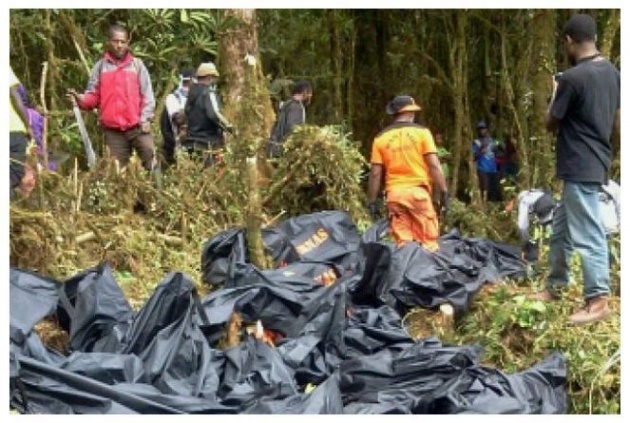
The first bodies of 54 people killed when a plane went down in eastern Indonesia were Wednesday carried from the remote crash site after bad weather hampered efforts to airlift them.
The remains of six people who died when the Trigana Air plane crashed during a short flight in bad weather Sunday had arrived at the settlement of Oksibil in Papua province, the military said.
A further 11 bodies were being carried through the dense forests and mountainous terrain, said local military spokesman Pudji Teguh Rahardjo. About 300 local people were involved in the recovery effort.
Once recovered, the bodies will be flown to Jayapura, Papua’s capital.
Authorities had initially hoped to use helicopters to airlift the bodies from the site, but bad weather made it too dangerous to fly in the area Wednesday.
“The current conditions make it impossible for us to use helicopters, so we have to do it via land,” Rahardjo said.
The tragedy was just the latest air accident in Indonesia, which has a poor aviation safety record and has suffered major disasters in recent months, including the crash of an AirAsia plane in December with the loss of 162 lives.
It took rescuers two days to reach the site, about 15 kilometres (nine miles) from Oksibil, after initial efforts were hindered by the rough terrain, thick fog and heavy rain.
They found the ATR 42-300 twin-turboprop aircraft in pieces scattered across a fire-blackened clearing, and the bodies of those who had been aboard.
They also recovered the plane’s black box flight data recorders, and some of the 6.5 billion rupiah ($470,000) in government social assistance funds that was being transported for distribution to poor families. Some of the money was badly burnt.
A team of three investigators from France’s BEA agency, which probes air accidents, has headed to Indonesia along with four technical advisors from ATR, a European plane maker based in France, to look into the accident.
The plane had set off from Jayapura on what was supposed to be a 45-minute flight to Oksibil, but lost contact 10 minutes before landing as it sought to descend in heavy cloud and rain.
The airline has said the accident was likely caused by bad weather.
Small aircraft are commonly used for transport in rugged Papua, one of the most remote corners of the sprawling Indonesian archipelago, and bad weather has caused several accidents in recent years.
Trigana Air, a small domestic Indonesian airline, has experienced a string of serious incidents and is banned from flying in European Union airspace.



